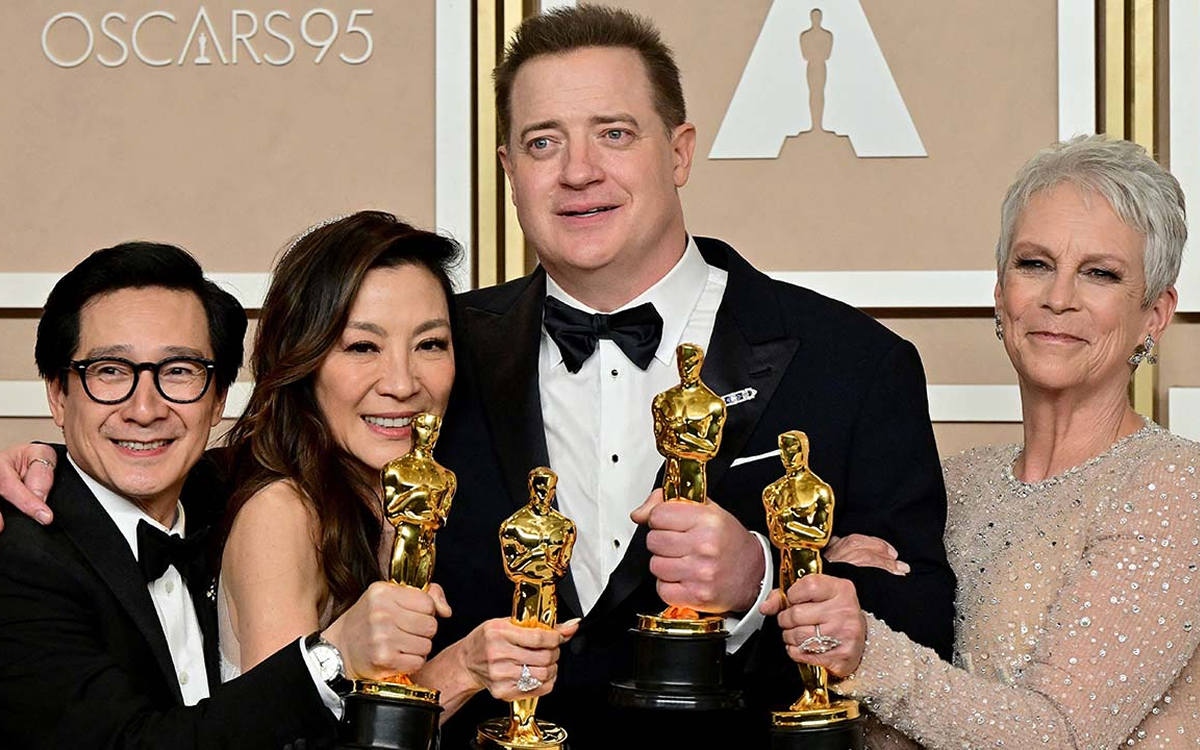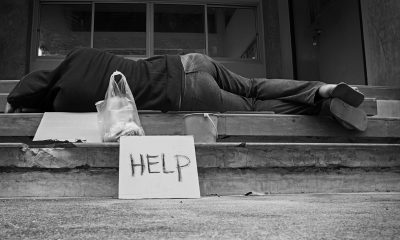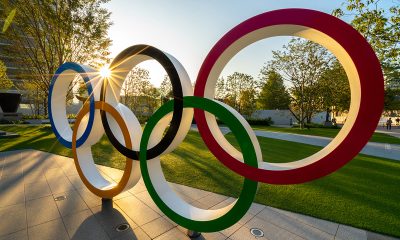Arts & Entertainment
Oscars so safe
Fraser wins for playing gay in ‘Whale,’ but night belonged to ‘Everything’

It must be said that the 95th Annual Academy Awards were doomed to be a letdown before they ever started. After all, last year’s ceremony included a physical assault on a presenter by an A-lister – who then proceeded to win the Best Actor award! Even by rewarding an indie underdog for becoming a populist hit by giving it a record-setting sweep of the major categories, how could this year’s Oscar broadcast hope to top that?
Snarky digs aside, the Academy had already squandered a lot of its good will by announcing a slate of nominees that seemed a step backward in its recent efforts toward diversity. While 2022’s honors included overdue recognition for Asian American talent, the notable shortage of people of color or LGBTQ individuals among the nominees had already led many observers to write off this year’s Oscars as just another backsliding return to the all-too-familiar status quo; and when the broadcast itself finally happened, the Jimmy Kimmel-led ceremony played it so safe that the proceedings seemed dull even in comparison to other Oscar shows – and as anyone who’s ever watched one will certainly attest, that’s saying a lot. It’s almost as if, after a few years of pushing the boundaries, controversy, and conservative backlash over a perceived capitulation to “woke” sensibilities had pressured the Academy into a return to business as usual.
In fairness, that assessment feels a little unreasonable, considering that “Everything Everywhere All at Once” – a movie in which the survival of multiple universes hinges in no small part on a mother’s acknowledgment and acceptance of her child’s queer sexuality – had enough critical and popular momentum going into the ceremony to make its claiming of the top prize all but inevitable. The popular surprise indie sci-fi hit claimed that prize and more – including Best Actress for cinema icon Michelle Yeoh and supporting honors for co-stars Ke Huy Quan and Jamie Lee Curtis, as well as wins in the Direction and Original Screenplay categories for filmmakers Daniel Scheinert and Daniel Kwan – to take home an impressive seven of the 11 awards for which it was nominated; child-actress-turned-celebrated-filmmaker Sarah Polley, while shut out of the Best Director category for “Women Talking” in favor of an all-male roster of nominees, took the prize for Best Adapted Screenplay nevertheless; Best Actor winner Brendan Fraser, while himself not gay, earned his victory for a deeply humanizing portrayal of a gay man and is a very public survivor of alleged same-gender sexual harassment in the workplace – a reminder that #MeToo is not just a “women’s issue” but a cause encompassing even those in positions most seemingly insulated from such abuses.
All these winning films – as well as numerous others among their fellow winners and nominees –are queer-inclusive, if not directly queer-focused. Though other queer nominees – like Belgian director Lukas Dhont’s “Close” for Best International Feature and Laura Poitras’ Nan Goldin profile “All the Beauty and the Bloodshed” for Best Documentary Feature – failed to take their respective categories, the overall queer presence represented in this year’s nominated films is too widespread and deeply integrated to be ignored.
Still, in today’s very divided cultural atmosphere, such equivocating overtures toward a more equitable Oscar playing field can undeniably feel like hollow, insincere tokens, convenient to bestow on their non-LGBTQ recipients thanks to the more universal appeal of the movies that earned them a place at the table; and while the wins for Yeoh and nostalgic Gen X fan favorite Quan represented historic firsts for Asian American inclusion, nominations for Viola Davis in “The Woman King” and “Till” star Danielle Deadwyler as Best Actress, or for Jeremy Pope and Gabrielle Union of “The Inspection” as Best Actor and Supporting Actress, respectively, would have gone a lot further toward proving the Academy’s commitment to true diversity than its loading of the stage with an ostentatiously multi-ethnic roster of presenters – an overcompensation tactic that becomes increasingly obvious every time they deploy it.
As for the ceremony itself, there were some highlights, such as Lady Gaga, with a face freshly scrubbed of her red carpet makeup, passionately delivering a performance of nominated song “Hold My Hand” from “Top Gun: Maverick,” or fellow pop diva Rihanna’s rendition of “Lift Me Up” from “Wakanda Forever” – not to mention the wildly entertaining production number staged to the eventual Best Song winner, “Naatu Naatu” from the Indian blockbuster “RRR.” So, too, were there memorable moments from among the presentations, like the infectious wave of authentic joy that met Quan’s and Curtis’ early wins or Fraser’s genuinely choked-up, self-effacing acceptance speech, as well as a few polite-but-pointed barbs and zingers aimed at various low-hanging political targets – and, of course, at Will Smith – along the way. Even so, the atmosphere of the evening was decidedly contained, marked by a frankly uncharacteristic effort from Hollywood’s elite to remain on their best behavior and avoid ruffling too many feathers – and while that may have made for an evening relatively free of controversy, it also resulted in an Academy Awards show arguably far less entertaining than some of the notoriously embarrassing debacles they’ve produced in past years.
With all that in mind, it’s easy to see Sunday night’s Oscar ceremony as just another validation for people who loathe the Oscars. Yet while the Academy might seem to be some monolithic organization handing out decrees, its awards are bestowed by a voting body made up of individual film professionals, each with their own opinions about who the winners should be, and many of whom likely feel no obligation toward following whatever cultural or political agendas the organization itself may be hoping to advance. That means that whatever good intentions it proclaims itself to have, the Academy will always be little more than a barometer – and, perhaps, a convenient scapegoat – for an industry that perpetually drags its feet. After all, can we really blame the Academy for failing to recognize queer-centric and queer-friendly content – or content centered on any demographic that isn’t white, male, and heterosexual – when there is still so little of it to choose from among the award-worthy movies the mainstream continues to offer us?
There’s no right answer to that question, perhaps, only food for thought as we continue to press Hollywood to do better; that’s the only way we’ll ever see wider inclusion on the big screen. In the meantime, it’s important to remember that deciding the “best” of anything is always an entirely subjective exercise, which means that the Oscars are ultimately less about gauging quality than they are about measuring cultural attitudes toward the content – and the way that content is presented – that the movie industry produces. That makes awards like the Oscars an invaluable tool, perhaps, but does that mean it’s worth putting up with all the shallow, facile, tribalistic conversation that inevitably happens around them?
In a year like this one, when the Academy honors films that uplift and celebrate outsiders, underdogs, and ordinary people, that emphasize kindness and compassion, that allow for resolution and redemption without destructive conflict or violence, then it feels like the answer is yes.
The complete list of winners is below:
Best Picture: “Everything Everywhere All at Once”
Best Actress in a Leading Role: Michelle Yeoh, “Everything Everywhere All at Once”
Best Actor in a Leading Role: Brendan Fraser, “The Whale”
Best Director: Daniel Kwan and Daniel Scheinert,“Everything Everywhere All at Once”
Actress in a Supporting Role: Jamie Lee Curtis, “Everything Everywhere All at Once”
Actor in a Supporting Role: Ke Huy Quan, “Everything Everywhere All at Once”
Best Animated Feature Film: “Guillermo del Toro’s Pinocchio”
Best Original Song: M.M. Keeravani and Chandrabose,“Naatu Naatu,” “RRR”
Best Original Screenplay: Daniel Kwan and Daniel Scheinert,“Everything Everywhere All at Once”
Best Adapted Screenplay: Sarah Polley, “Women Talking”
Best International Feature Film: “All Quiet on the Western Front”
Best Documentary Feature Film: “Navalny”
Best Cinematography: James Friend, “All Quiet on the Western Front”
Best Visual Effects: “Avatar: The Way of Water”
Best Costume Design: Ruth E. Carter, “Black Panther: Wakanda Forever”
Best Makeup and Hairstyling: Adrian Morot, Judy Chin, and Annemarie Bradley, “The Whale”
Best Production Design: Christian M. Goldbeck and Ernestine Hipper,“All Quiet on the Western Front”
Best Film Editing: Paul Rogers, “Everything Everywhere All at Once”
Best Original Score: Volker Bertelmann,“All Quiet on the Western Front”
Best Live Action Short: “An Irish Goodbye”
Best Animated Short: “The Boy, the Mole, the Fox and the Horse”
Best Documentary Short: “The Elephant Whisperers”
Best Sound: “Top Gun: Maverick”
Sports
Attitude! French ice dancers nail ‘Vogue’ routine
Cizeron and Fournier Beaudry strike a pose in memorable Olympics performance

Madonna’s presence is being felt at the Olympic Games in Italy.
Guillaume Cizeron and his rhythm ice dancing partner Laurence Fournier Beaudry of France performed a flawless skate to Madonna’s “Vogue” and “Rescue Me” on Monday.
The duo scored an impressive 90.18 for their effort, the best score of the night.
“We’ve been working hard the whole season to get over 90, so it was nice to see the score on the screen,” Fournier Beaudry told Olympics.com. “But first of all, just coming out off the ice, we were very happy about what we delivered and the pleasure we had out there. With the energy of the crowd, it was really amazing.”
Watch the routine on YouTube here.
Italy
Olympics Pride House ‘really important for the community’
Italy lags behind other European countries in terms of LGBTQ rights

The four Italian advocacy groups behind the Milan Cortina Winter Olympics’ Pride House hope to use the games to highlight the lack of LGBTQ rights in their country.
Arcigay, CIG Arcigay Milano, Milano Pride, and Pride Sport Milano organized the Pride House that is located in Milan’s MEET Digital Culture Center. The Washington Blade on Feb. 5 interviewed Pride House Project Manager Joseph Naklé.
Naklé in 2020 founded Peacox Basket Milano, Italy’s only LGBTQ basketball team. He also carried the Olympic torch through Milan shortly before he spoke with the Blade. (“Heated Rivalry” stars Hudson Williams and Connor Storrie last month participated in the torch relay in Feltre, a town in Italy’s Veneto region.)
Naklé said the promotion of LGBTQ rights in Italy is “actually our main objective.”
ILGA-Europe in its Rainbow Map 2025 notes same-sex couples lack full marriage rights in Italy, and the country’s hate crimes law does not include sexual orientation or gender identity. Italy does ban discrimination based on sexual orientation in employment, but the country’s nondiscrimination laws do not include gender identity.
ILGA-Europe has made the following recommendations “in order to improve the legal and policy situation of LGBTI people in Italy.”
• Marriage equality for same-sex couples
• Depathologization of trans identities
• Automatic co-parent recognition available for all couples
“We are not really known to be the most openly LGBT-friendly country,” Naklé told the Blade. “That’s why it (Pride House) was really important for the community.”
“We want to use the Olympic games — because there is a big media attention — and we want to use this media attention to raise the voice,” he added.

Naklé noted Pride House will host “talks and roundtables every night” during the games that will focus on a variety of topics that include transgender and nonbinary people in sports and AI. Another will focus on what Naklé described to the Blade as “the importance of political movements now to fight for our rights, especially in places such as Italy or the U.S. where we are going backwards, and not forwards.”
Seven LGBTQ Olympians — Italian swimmer Alex Di Giorgio, Canadian ice dancers Paul Poirier and Kaitlyn Weaver, Canadian figure skater Eric Radford, Spanish figure skater Javier Raya, Scottish ice dancer Lewis Gibson, and Irish field hockey and cricket player Nikki Symmons — are scheduled to participate in Pride House’s Out and Proud event on Feb. 14.
Pride House Los Angeles – West Hollywood representatives are expected to speak at Pride House on Feb. 21.
The event will include a screening of Mariano Furlani’s documentary about Pride House and LGBTQ inclusion in sports. The MiX International LGBTQ+ Film and Queer Culture Festival will screen later this year in Milan. Pride House Los Angeles – West Hollywood is also planning to show the film during the 2028 Summer Olympics.
Naklé also noted Pride House has launched an initiative that allows LGBTQ sports teams to partner with teams whose members are either migrants from African and Islamic countries or people with disabilities.
“The objective is to show that sports is the bridge between these communities,” he said.
Bisexual US skier wins gold
Naklé spoke with the Blade a day before the games opened. The Milan Cortina Winter Olympics will close on Feb. 22.
More than 40 openly LGBTQ athletes are competing in the games.
Breezy Johnson, an American alpine skier who identifies as bisexual, on Sunday won a gold medal in the women’s downhill. Amber Glenn, who identifies as bisexual and pansexual, on the same day helped the U.S. win a gold medal in team figure skating.
Glenn said she received threats on social media after she told reporters during a pre-Olympics press conference that LGBTQ Americans are having a “hard time” with the Trump-Vance administration in the White House. The Associated Press notes Glenn wore a Pride pin on her jacket during Sunday’s medal ceremony.
“I was disappointed because I’ve never had so many people wish me harm before, just for being me and speaking about being decent — human rights and decency,” said Glenn, according to the AP. “So that was really disappointing, and I do think it kind of lowered that excitement for this.”
Puerto Rico
Bad Bunny shares Super Bowl stage with Ricky Martin, Lady Gaga
Puerto Rican activist celebrates half time show

Bad Bunny on Sunday shared the stage with Ricky Martin and Lady Gaga at the Super Bowl halftime show in Santa Clara, Calif.
Martin came out as gay in 2010. Gaga, who headlined the 2017 Super Bowl halftime show, is bisexual. Bad Bunny has championed LGBTQ rights in his native Puerto Rico and elsewhere.
“Not only was a sophisticated political statement, but it was a celebration of who we are as Puerto Ricans,” Pedro Julio Serrano, president of the LGBTQ+ Federation of Puerto Rico, told the Washington Blade on Monday. “That includes us as LGBTQ+ people by including a ground-breaking superstar and legend, Ricky Martin singing an anti-colonial anthem and showcasing Young Miko, an up-and-coming star at La Casita. And, of course, having queer icon Lady Gaga sing salsa was the cherry on the top.”
La Casita is a house that Bad Bunny included in his residency in San Juan, the Puerto Rican capital, last year. He recreated it during the halftime show.
“His performance brought us together as Puerto Ricans, as Latin Americans, as Americans (from the Americas) and as human beings,” said Serrano. “He embraced his own words by showcasing, through his performance, that the ‘only thing more powerful than hate is love.’”
-

 Colombia4 days ago
Colombia4 days agoLGBTQ Venezuelans in Colombia uncertain about homeland’s future
-

 District of Columbia4 days ago
District of Columbia4 days agoD.C. bar Rush facing eviction on charge of failing to pay rent
-

 District of Columbia4 days ago
District of Columbia4 days agoD.C. non-profits find creative ways to aid the unhoused amid funding cuts
-

 Sports4 days ago
Sports4 days agoBlade, Pride House LA announce 2028 Olympics partnership




















